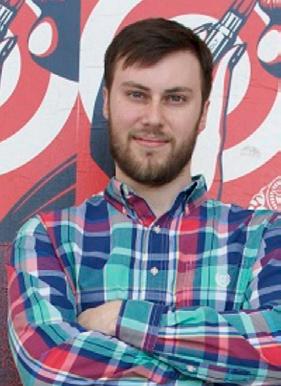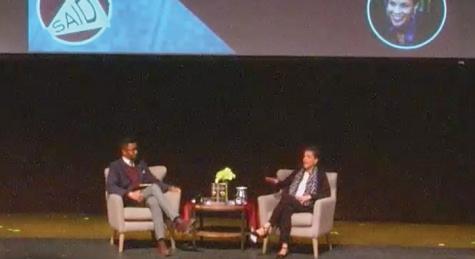
4 minute read
Holocaust and Genocide Awareness Week
HONORING
HOLOCAUST AND GENOCIDE AWARENESS WEEK
Advertisement
Annually, since 1977, the committee of improved the accessibility and user experience Northeastern faculty, students, and staff of the Holocaust and Genocide Awareness who constitute the Holocaust and Genocide Committee Archives. Yael Sheinfeld, recipient Awareness Committee have deliberated of the Gideon Klein Scholarship that supports thoughtfully on how best to honor the student work at the intersection of music and commitment to commemorate the losses of the Holocaust, produced an animated film based the Holocaust and importantly, how to fulfill the on the book The Children’s Tree of Terezin which mandate to learn from the history of genocides, tells the story of how children incarcerated in a ever wrestling with the question of what it might concentration camp were encouraged by their take to avoid repeating history’s most devastating teacher to plant a tree. The tree survives until tragedies. These conversations begin with an today, with saplings planted the world over, a assessment of where we are now in the world, story about wresting hope from despair. On as my colleagues ask one another, “What are our September 24, 2020, Jessie and Yael presented most urgent concerns? What do we need to be their projects virtually to the larger community. thinking and educating about this year?” In recent years, we trained our eyes on historical turns to In March 2020, the university hosted a fascism and aggressive photographic and informational exhibit entitled nationalism. In the fall “Beyond Duty, Diplomatic Heroism during the of 2019, still innocent Holocaust,” sponsored by the General Consulate of the pandemic that of Israel to New England. This exhibit featured a was about to disrupt our series of floor-to-ceiling panels, each highlighting routines — an experience the story and heroism of a wartime diplomat who of disruption that will took great personal risks to save Jewish lives. in all likelihood inform Each biography is moving, and the exhibit, which our programs in future was mounted along the walls of Northeastern’s years — we talked about International Village — in the well-trafficked corridor examples of heroism, of a building that includes classrooms, dorm optimism, activism, and rooms, and a cafeteria — beckoned passersby, the changing nature of students, in particular, to be inspired by the JESSIE SIGLER, THE 2019 RUDERMAN SCHOLAR, AND YAEL SHEINFELD, THE hate, as exemplified by anti-Semitism. bravery of people who resisted; people who used their power to break rules and save lives. As always, we were planning an interrelated set of programs, from invited speakers, including survivor testimony, to performances and films, and showcases for 2019-20 GIDEON KLEIN SCHOLAR AND CLASS OF 2021 HUNTINGTON 100 INDUCTEE. Then the pandemic struck, and we retreated to our private spaces, learning on a small scale how danger can take us by surprise and force us to adjust. the original research and creative expressions of students and faculty. Two students worked energetically on their projects. Jessie Sigler worked with Northeastern’s library to create searchable transcriptions of all the committee-sponsored survivor talks since 1993, which dramatically
PHOTOGRAPHIC AND INFORMATIONAL EXHIBIT “BEYOND DUTY, DIPLOMATIC HEROISM DURING THE HOLOCAUST”


This April Kalah Karloff, recipient of the 2020–21 Gideon Klein Scholarship, presented her work “Music and the Holocaust: ‘We Made Music in Hell’” followed by Professor Emeritus Joshua Jacobson who presented “Music and the Holocaust: A Retrospective on the Gideon Klein Award.”
Karloff’s project examines how music was used as a form of torture by the Nazis in concentration camps and how the effect of music on the human body can change with its context. Professor Jacobson provided a retrospective of the many musical projects fostered by the Gideon Klein Award, with his own commentary.
We also heard from Esther Adler who talked about her experience fleeing Germany as a teenager after experiencing the events of Kristallnacht. The annual Morton Lecture by Professor David Nirenberg, Dean of the Divinity School at the University of Chicago, discussed “Does the Past History of Anti-Semitism Tell Us Anything about Its Future?” Professor Nirenberg has spent his career exploring the different ways that Jewish, Christian, and Muslim communities have related to one another. The Morton Lecture, in addition to the very popular annual survivor talk, highlight to students and the public the importance of Holocaust education in understanding the past and present.
In my role as committee chair, I am especially proud of how student engagement ensures the continued vitality of this important work, which forces us, year after year, to confront the paradox of the human capacity for both beauty and destruction.
— Simon Rabinovitch Associate Professor of History
Read more about the HAGAW 2021 events at News@Northeastern


The 28th Annual ROBERT SALOMON MORTON LECTURE
Does the Past History of ANTI-SEMITISM
Tell us Anything about ITS FUTURE?
DAVID NIRENBERG
David Nirenberg, whose many books include Anti-Judaism: The Western Tradition, is the Dean of the Divinity School and the Deborah R. and
Edgar D. Janotta Distinguished Service Professor of Medieval History and Social Thought at the University of Chicago.
WEDNESDAY, APRIL 7, 2021
7:00–9:00 PM • VIRTUAL PRESENTATION
FREE AND OPEN TO THE PUBLIC • REGISTRATION REQUIRED
For more information, a full schedule of Holocaust and Genocide Awareness Week events, and to register please visit http://bit.ly/HAGAW2021.
REGISTER
Presented by the Holocaust and Genocide Awareness Committee, the Jewish Studies Program, and the Humanities Center, in partnership with the Office of the Provost. Sponsored by the Robert S. Morton Lecture Fund at Northeastern University.










